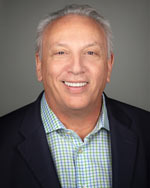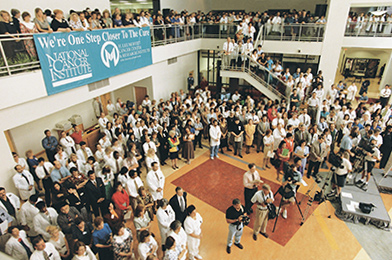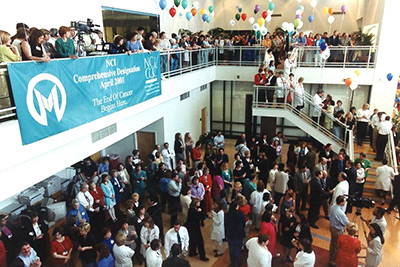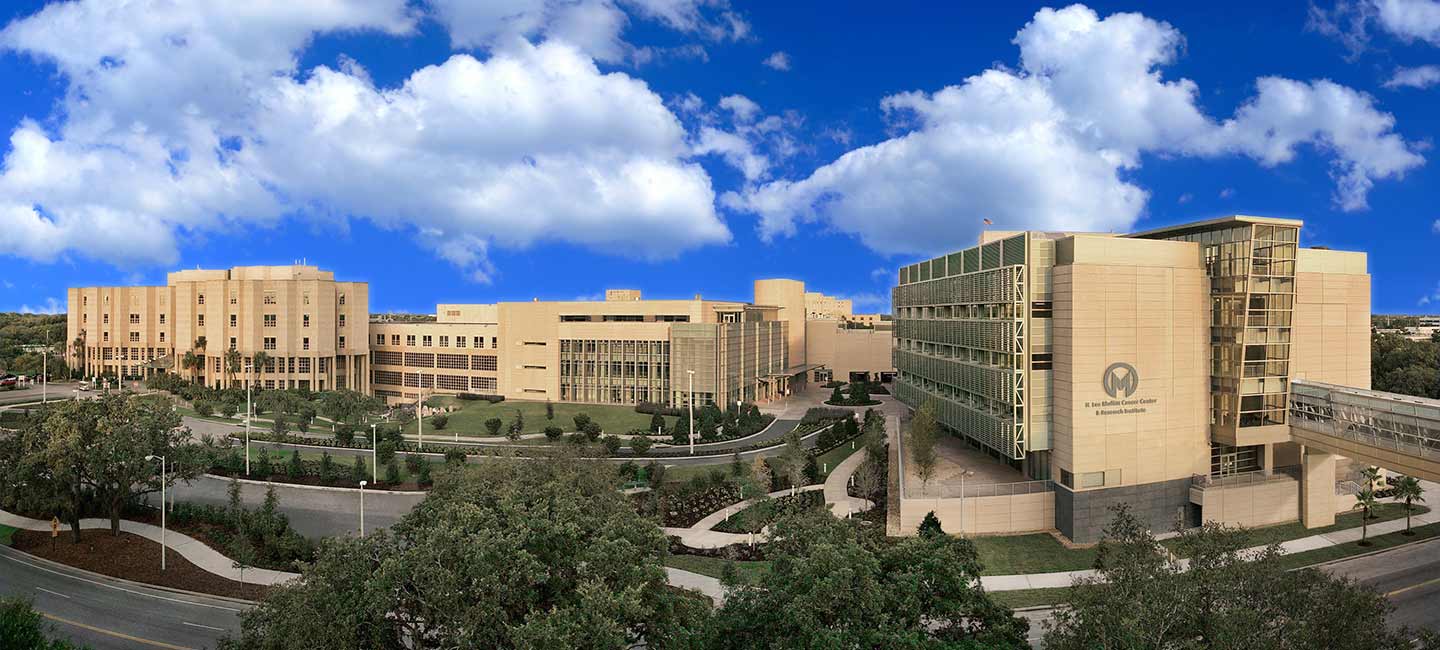The Impact of National Cancer Institute Designation
Moffitt Cancer Center is celebrating the renewal of its National Cancer Institute (NCI) designation as a Comprehensive Cancer Center. The cancer center has held this designation for 20 years and is the only institution based in Florida to have this distinction.
NCI Comprehensive Cancer Center status recognizes Moffitt’s leadership in transdisciplinary, state-of-the-art research to develop new and better approaches to preventing, diagnosing and treating cancer. Only 2.8% of cancer research institutions in the United States have received the prestigious Comprehensive Cancer Center designation.

“NCI Comprehensive Cancer Center designation recognizes that Moffitt is making an impact in cancer care, which includes every aspect from prevention and treatment to outcomes and survivorship. This designation reflects that our work is changing scientific paradigms, clinical practice and national health care policies,” said Dr. John Cleveland, center director at Moffitt. “And, most importantly, those impacts are being felt and meet the needs of the communities we serve.”

Moffitt employees gather to celebrate receiving NCI designation in 1998.
NCI designation must typically be renewed every five years. The rigorous renewal process involves a peer-reviewed grant application called the cancer center support grant that is often well over 2,500 pages. It provides an in-depth look at the institution, its research programs, community outreach and engagement, leadership, career development and education and, most importantly, its ability to translate scientific discoveries into new tools to detect, prevent and treat cancer. In addition to the application, a group of peer reviewers and the NCI conduct a site visit shortly after grant submission to evaluate the center firsthand.
Cleveland and his research leadership team began drafting their cancer center support grant application and planning the site visit in 2019, two years before it was due. In January, the team submitted the grant application to the NCI and a site visit was conducted virtually in May.

Moffitt employees gather in the hospital lobby to celebrate receiving NCI Comprehensive Cancer Center designation in 2001.
After the site visit, the NCI review committee takes time to go over the cancer center’s submission and provides an impact score, which determines if the cancer center support grant is approved. Moffitt received word of its grant approval in September with its highest ranking ever, and funding that will support the cancer center will begin in February 2022.
Cancer center support grant funding isn’t as substantial as some may believe. For Moffitt, the grant will bring in approximately $4 million per year, but these funds are necessary to help support the structure needed to create a collaborative and translational environment for cancer research. The institution must still cover additional infrastructure and support costs. Faculty members must also still compete for external grants to cover their salaries, hire staff, purchase supplies and pay for use of core laboratory facilities. But the comprehensive designation conveys a level of credibility that far exceeds any monetary value.
Moffitt first received NCI designation in 1998, five years after beginning its research enterprise. The cancer center was awarded Comprehensive Cancer Center designation in 2001 and has successfully been awarded redesignation during four subsequent renewal periods.
Impacting Our Patients and the Community
NCI-designated Comprehensive Cancer Centers, like Moffitt, bring together the nation’s top physicians and researchers to advance science and patient care. Patients who are treated at NCI designated cancer centers receive the most advanced care, including access to a wide range of cutting-edge clinical trials and research that is paving the way for the future of cancer care.
Studies show that patients who receive care at an NCI-designated cancer center can improve their long-term survival rates by up to 25%. “At Moffitt, our patient outcomes often exceed the national average, in part because of our ongoing research efforts and our robust portfolio of clinical trials. We are committed to translating our research discoveries into new therapies, diagnostics and supportive care for our patients,” said Cleveland.
Moffitt has the largest cancer-focused clinical research operations in Florida with more than 600 active clinical interventional trials and over 100 observational studies. To continue the cancer center’s remarkable success in this area, which is a critical element of the cancer center support grant, Cleveland appointed Dr. Eric Haura to lead Moffitt’s clinical research operations and to extend its reach and bring clinical trial opportunities to even more patients in our community, state and nation.

Dr. Susan Vadaparampil, Associate Center Director, Community Outreach, Engagement & Equity
This is accomplished, in part, through community outreach efforts. In 2018, Moffitt established the Office of Community Outreach, Engagement and Equity that is being led by Dr. Susan Vadaparampil. The goal of this office is to provide outreach, education and clinical care to the community with a specific emphasis on addressing the health disparities of those who are underserved and underrepresented, an important aspect of the cancer center support grant.
The community is defined by what the NCI refers to as a catchment area, or a geographic area surrounding the cancer center that is home to most of its patients. For Moffitt, it’s a 15-county block of west Central Florida that is home to more than 78% of our patients.
Looking to the Future
So, what does the next cancer center support grant period hold for Moffitt? It can be summed up in one word: growth. Moffitt plans to expand research and outreach in our catchment area, which is expanding to include 23 counties or half the population of Florida.
“We were established by the state to serve Floridians. We want to make sure our impact is felt across the state. Our Community Outreach, Engagement and Equity office is working with several partner organizations to get our research and education programs to every community we serve. And Moffitt just received a new RV with video and internet capabilities that will help us with these efforts,” said Cleveland.
Moffitt is also working to develop a new research program in cancer metabolism. Metabolism is viewed as a new paradigm for cancer treatment that targets the mechanisms cancer cells use to grow. In addition to the new program, the cancer center will significantly increase its efforts in immunotherapy and cell therapy, which involve teaching the body’s immune system to fight cancer, as well as artificial intelligence and machine learning, and cancer care delivery.
Workforce and infrastructure growth are key to these plans. Moffitt anticipates recruiting at least 50 new faculty members. The cancer center is also developing a new biomedical campus on 775 acres in Pasco County. It will include a new research laboratory building, expanded facilities and capabilities to support development of immunotherapies and new targeted agents, as well as industry collaborations. New clinical, prevention and wellness facilities are also planned.

Dr. Kenneth Wright, Associate Center Director, Research Education & Training
Over the next decade, Moffitt expects to double in size. And with that growth comes the importance of education. The cancer center has a dedicated Office of Research Education and Training that is being led by Dr. Kenneth Wright, who oversees research and clinical education programs starting as early as high school and continuing through undergraduate, graduate and postdoctoral studies. Currently, Moffitt has four integrated majors within its Cancer Biology Ph.D. Program with the University of South Florida and is hoping to grow those programs and add others.
“Education is a key deliverable of the cancer center,” said Cleveland. “We need to educate the next generation of scientists, clinicians, nurses, indeed every component of the biomedical workforce. It is our explicit charge to reach out and make a difference, and to make sure that as we expand our footprint here in Florida, that we are training the individuals we need to carry out Moffitt’s mission to contribute to the prevention and cure of cancer.”



